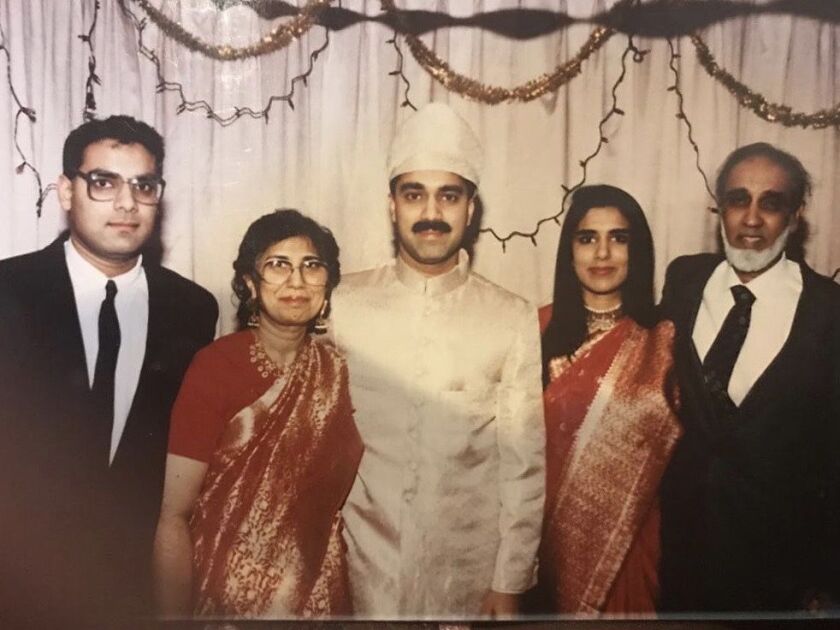When Dr. Najma Khan was 9 years old, she pushed her father to send her to school.
She was born in Hyderabad, India, in 1931 when opportunities for girls were limited. Most women, like her mother, had little formal schooling. But when a female cousin her age started school, Dr. Khan persuaded her father to let her attend, too.
She died June 15, of pancreatic cancer, in north suburban Lincolnwood, where she lived with her husband, Mir Noman Khan.
“She was very determined,” said one of Dr. Khan’s granddaughters, Iman Khan. “If there was something that needed to get done, it would happen.”
The thing that needed to get done, in this case, was Dr. Khan’s education. She attended school and graduated early, at age 15.
At 19, in 1950, she started medical school at Hyderabad’s Osmania University.
Medical school, said her sister Badar Farooq, was unheard of for girls. But four years later, Dr. Khan graduated and became the first doctor in her family, and one of the first people to receive an OB-GYN certificate in the country, according to her son Sayeed Khan.
“She was very progressive,” said Farooq, of her sister. Dr. Khan’s break with tradition opened doors for her three younger sisters: all went on to school and university.
Creating opportunities for her sisters shows how she “struggled for other people,” said granddaughter Iman Khan.
This empathy also ran through Dr. Khan’s medical career. She ran a free health clinic out of her parents’ house in her 20s, turning the living room into a reception room.
In 1967, Dr. Khan and her family moved to America, joining the wave of migration prompted by the 1965 Immigration Act, designed to encourage immigration that wasn’t predominantly European. She spent three years living on Penn State’s campus while her husband worked towards his Ph.D. in chemistry.
In 1970, however, Dr. Khan was offered residency in Chicago, at Columbus Hospital. She moved with her family to North Park, which was close to work.
Life in Chicago was challenging for new immigrants, with its freezing weather so different from India. Dr. Khan also had to start her four year OB-GYN residency all over again.
Residencies can be intense, with high expectations from superiors.
“Those are the worst years of your life, and she sucked it up and did it,” said Iman, who has just started her own OB-GYN residency.
Dr. Khan was also taking care of the couple’s young children, and experienced, as did her friend Dr. Ayesha Sultana, “the babysitting problem” — that is, what to do with your children when you’re working. But the real challenge for Dr. Khan was completing her residency with breast cancer, having been diagnosed in 1972. She told Iman stories of feeling so sick at work, she was “clinging to the walls.”
Despite a successful mastectomy and radiation therapy, she was expected to live no more than five years.
“I asked, ‘When did you know that you were going to live?’” her son Sayeed recalled. “She said, ‘Never.’”
But her “make the most of things” attitude, according to her granddaughter, saw Dr. Khan live nearly 10 times longer than her prognosis.
When she became an attending OB-GYN, she went out of her way for patients. If a birth took a long time, she would wait at the hospital said Dr. Sultana, who attended Dr. Khan’s medical college. “Usually, doctors go home, but she would wait.”
The number of babies Dr. Khan delivered was “easily in the thousands,” according to Sayeed. She also delivered many babies within the local South Asian Muslim community and her family — at her funeral, a distant relative told Sayeed that she and her two brothers had all been delivered by Dr. Khan.
Dr. Khan’s open-mindedness also made her a family mediator.
“She was always on the phone with somebody,” said Iman, adding that Dr. Khan would try to figure out the best way to handle a situation, not just her way.
Dr. Khan, a dedicated member of the Muslim Community Center of Chicago, frequently gave her friends and relatives medical advice, often attending to her family’s shots and medications.
Days before she passed away, she was still asking Sayeed whether her husband had received his insulin shot — she had been the one to administer these, in the past.
In addition to her son Sayeed Khan and husband Mir Noman Khan, Dr. Khan’s survivors include: daughter Humera Khan; sisters Asma Qadri, Shams Muktar and Badar Farooq; and three grandchildren. Her elder son Hasan Khan, a physician, died last year.
Services have been held.






